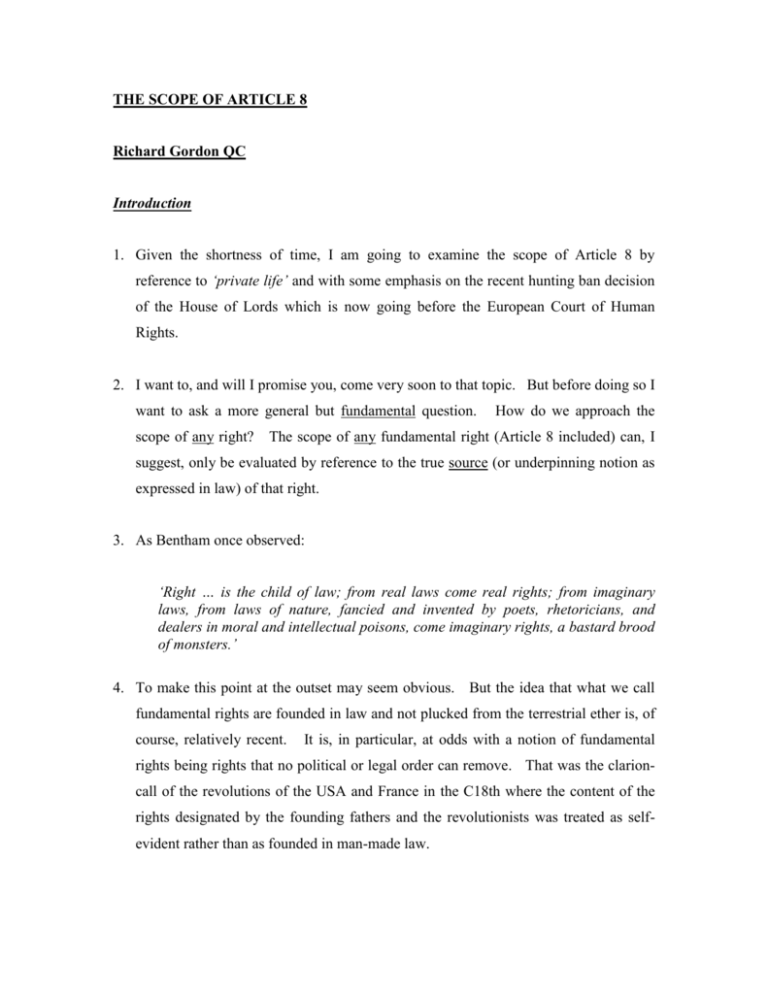the scope of article 8 - The Constitutional & Administrative Law Bar
advertisement

THE SCOPE OF ARTICLE 8 Richard Gordon QC Introduction 1. Given the shortness of time, I am going to examine the scope of Article 8 by reference to ‘private life’ and with some emphasis on the recent hunting ban decision of the House of Lords which is now going before the European Court of Human Rights. 2. I want to, and will I promise you, come very soon to that topic. But before doing so I want to ask a more general but fundamental question. scope of any right? How do we approach the The scope of any fundamental right (Article 8 included) can, I suggest, only be evaluated by reference to the true source (or underpinning notion as expressed in law) of that right. 3. As Bentham once observed: ‘Right … is the child of law; from real laws come real rights; from imaginary laws, from laws of nature, fancied and invented by poets, rhetoricians, and dealers in moral and intellectual poisons, come imaginary rights, a bastard brood of monsters.’ 4. To make this point at the outset may seem obvious. But the idea that what we call fundamental rights are founded in law and not plucked from the terrestrial ether is, of course, relatively recent. It is, in particular, at odds with a notion of fundamental rights being rights that no political or legal order can remove. That was the clarioncall of the revolutions of the USA and France in the C18th where the content of the rights designated by the founding fathers and the revolutionists was treated as selfevident rather than as founded in man-made law. 2 5. So, we look to the law for definition. For good or ill, the relevant law that we have to consider is the ECHR. How does that law approach fundamental rights? Well, for the most part, the ECHR (with its post holocaust emphasis on the moral value and integrity of the person) has eschewed economic and social rights and has opted for individual rights based on man’s essential dignity. The choice could have been a different one. If, for example, rights (as expressed in law) flow from membership of a social community cases will not necessarily be decided in the same way as if rights flow from our intrinsic humanity. And even if rights do have their source in our intrinsic humanity, those rights may be adumbrated differently if one has a particular assumption as to what aspect of our humanity is at stake. 6. Fortunately, it is in the context of Article 8 at least, unnecessary to embark upon a philosophical debate about the source or underpinning basis of that right under the ECHR because it has (albeit recently) been set out in a Strasbourg case. 7. In the Pretty case (see Pretty v. UK (2002) 35 EHRR 1, 35) (at paragraph 61) and with respect to private life the European Court of Human Rights observed as follows: ‘As the Court has had previous occasion to remark, the concept of “private life” is a broad term not susceptible to exhaustive definition. It covers the physical and psychological integrity of a person. It can sometimes embrace aspects of an individual’s physical and social identity. Elements such as, for example, gender identification, name and sexual orientation and sexual life fall within the personal sphere protected by Article 8. Article 8 also protects a right to personal development, and the right to establish and develop relationships with other human beings and the outside world. Though no previous case has established as such any right to self-determination as being contained in Article 8 of the Convention, the Court considers that the notion of personal autonomy is an important principle underlying the interpretation of its [the Article 8] guarantees.’ [Underlining added] 8. There are three relevant points about this formulation. principle. First, it is a formulation of Secondly, that statement of principle includes the principle that the term 3 ‘private life’ as it occurs in Article 8 is not intended to be narrowly interpreted or, indeed, exhaustively defined. Thirdly, the notion of personal autonomy is important and underpins the Article 8 guarantees even though no previous case has actually said so. 9. It is with that statement of principle in mind that I approach, by reference to private life, the question of the proper scope of Article 8. The practical question is by what principle we can identify whether on the facts of any given case Article 8 is engaged and/or violated. The clue to the resolution of that question lies in the statement in Pretty which I have cited but the application of that statement requires two further ideas to constitute a principled approach to the scope of Article 8. It is to those ideas that I now turn. Article 8 – an overview 10. I want to focus on the possible approaches to the question of whether or not Article 8 is engaged or violated. The answer to this question is, I believe, the best way to discuss the scope of that Convention provision. Put shortly, the issue is whether, in principle, a broad or a narrow approach should be adopted by the Courts in respect of Article 8 and what that might mean in practice. We know from Pretty that a broad approach to the concept of private life is required but that still leaves a number of gaps to be filled. 11. As is well known, Article 8 has four dimensions. They are the right to respect for one’s: (i) private life, (ii) family life, (iii) home and (iv) correspondence These generic groupings undoubtedly encompass an Anglo-American notion of privacy with its concomitant elements of secrecy of personal information and seclusion. But do they go further? To what, if any, extent can it be argued that the interests protected by Article 8 are broader than merely giving protection against (to use the graphic phrase of the MR in the hunting ban case) ‘the morning rat-a-tat at the door’ of State intrusion? 4 12. It would have been entirely possible for the European Court to have confined Article 8 to such a limited ambit. Had that approach been taken then – like Robert Frost’s two roads diverging in a yellow wood and never meeting again – none of the difficulties which the cases throw up would ever have arisen 13. But the European Court has not, I suggest, adopted any such bright-line principle. Neither the Court, nor the former Commission has, for example, kept separate the scope of ‘private life’ from the distinct question of whether the State has violated Article 8. In the words of one of the commentators, the practice in Europe so far at least as private life is concerned ‘has been distinguished neither by its clarity nor its discipline.’ We might also agree with Stanley Burnton J’s description of Article 8 in one of the cases as ‘the least defined and most unruly of the rights enshrined in the Convention.’ 14. The absence of any clear regulating principle makes, it may be said, the search for that clear regulating principle somewhat artificial. And yet without a statement of principle it is not at all easy to see why the decided cases have fallen on different sides of the line. 15. So, for the purpose of argument, I am going to advance two principles that I suggest underpin the scope of Article 8 and then test those principles against some of the cases. 16. The first principle is that a broad approach is necessary to identify the relationship between Article 8(1) and Article 8(2) since, without such a broad approach there is correspondingly less need to justify potentially intrusive conduct on the part of the State. 17. The second principle is that a broad approach to the constituent elements and application of Article 8 is also needed to reflect the crucial role played by that 5 provision in a Western liberal democracy. That essentially democratic role is itself one (perhaps the best) reflection of the underlying autonomy that is, as already explained, central to a proper understanding of Article 8. 18. My main thesis is that these suggested principles explain much of the Strasbourg case law. If they are correct they require, I think, an expanded view of Article 8 to that currently taken in some of our domestic decisions. Even if they are not correct, the genie is now out of the bottle and I would argue that some reasoned attempt is still needed to explain why the boundary of Article 8 is set where it is in any given case. Reliance on degree rather than principle is, I believe, a wholly inadequate methodology to address and contain the problems that are now coming to the fore in the cases. Principle 1 – Article 8(1) and 8(2): the need for justification 19. The relationship between Article 8(1) and 8(2) is fundamental to an understanding of whether a broad or a narrow approach should be taken to whether Article 8 is engaged at all. As is well known (and as is the case with other similarly phrased rights) we have the familiar pattern whereby one provision (Article 8(1)) sets out the basic rights and another (Article 8(2)) stipulates the basis upon which those basic rights may lawfully be interfered with by the State. Obviously, if the Article 8(1) right is not engaged at all, then it becomes unnecessary to examine whether there has been any unlawful interference under Article 8(2). On a strict approach to the limits of protection afforded by Article 8(1) and a strict delimitation between Article 8(1) and Article 8(2) a great deal of intrusive State action might well be beyond the jurisdiction of the courts even to consider. 20. This suggests that there may be a choice to be made as to the true scope of Article 8(1). And, indeed, this is what Laws LJ considered to be the position in Sheffield City Council v Smart [2002] LGR 467. That case involved the question of whether possession actions against non-secure tenants engaged Article 8. In respect of the 6 relationship between Article 8(1) and Article 8(2), Laws L.J. said this (see paragraph 27): ‘…The court has to arrive at a judicial choice between two possibilities, a choice which transcends the business of finding out what the legislation’s words mean. The first choice (accepting Mr Underwood’s submission) would entail a judgment that the Convention requirement was met at the Article 8(1) stage: on balance, taking into account all the factors which I have listed in paragraph 23, there was no want of respect for the appellants’ homes. The second choice (accepting a prima facie violation of Article 8(1)), which I prefer, entails a judgment that the more rigorous and specific standards set out in Article 8(2) have to be met if the court is to hold that the evictions are compatible with the appellants’ Convention rights. The Convention is, as it were, much more remotely engaged in the fabric of our domestic law if the first, rather than the second, choice is taken. Part of the court’s task is to decide how close that engagement should be in the context in hand. Thus I do not eschew the first choice merely because I take the view that the second more naturally reflects the ordinary sense of the words used in Article 8(1). I consider as a matter of substance that the vindication and fulfilment of the Convention rights, for which purpose HRA was enacted, require that the domestic law procedures involved in these appeals should be subjected to scrutiny for conformity with the Article 8(2) standards. Such a process is demanded by the fullness of our municipal law of human rights.’ 21. Now it is true that in the later two Qazi cases decided by the House of Lords – dealing with the same subject matter as Smart - the proposition (accepted in Smart) that Article 8 was even arguably infringed where an order for possession is made against a non-secure tenant was rejected, by a majority, by the House of Lords. However, at no stage in the rather dense facts and analyses in Qazi was the general approach to the engagement of Article 8 suggested by Laws L.J. questioned in any way. It is, I believe, entirely correct and, as Lord Steyn (albeit in a minority in Qazi (1) but the only Law Lord in the two cases to cite those words) observed: ‘[t]his statement admirably reflects the meaning of article 8 and the European approach to its application. It is in accord with the new landscape created by the Human Rights Act 1998.’ 7 22. Once it is accepted that a broad approach must be taken at least in respect of the relationship between Article 8(1) and Article 8(2) so as to require more rather than less potentially invasive State action to be justified under Article 8(2) the question remains as to how one defines a principle accommodating a broad content to what is meant by private life, family life and so forth. That is my principle 2 which, shortly expressed, is that in its modern incarnation Article 8 must properly reflect democratic values and for that reason alone requires to be broadly interpreted and give appropriate protection against State regulation of activity that harms no-one save, perhaps, the party suffering the restriction. Principle 2 – the proper content of Article 8 23. If we do more than pay lip service to the idea of democracy we soon find ourselves in a twist about what democracy actually means. Like the ECHR the Human Rights Act 1998 provides a curb on crude majoritarianism – what John Stuart Mill called ‘statistical democracy’ (the tyranny of the majority). 24. But it is perfectly possible to avoid the dangers of crude majority rule (that is rule that is directed solely to the interests of the majority whatever its effect on minorities) and still fall into the clutches of something rather different but capable, I think, of being almost as insidious; that is, the regulation of activity by a State democratically elected and with its own moral or regulatory compass in terms of a legislative programme. It goes without saying that such a programme may be well-intentioned and may be entirely directed to what the legislature considers to be a better society overall. The question is whether Article 8 gives, or should give, any protection against such regulation. Do we accept that it is for the legislature to say what is best for us or is that a matter about which the guarantee of autonomy which underpins Article 8 has something significant to contribute? 25. Of course there is no unequivocal statement of what democracy entails. But the Strasbourg Court has, I believe, made it clear not just in Pretty that Article 8 contains 8 important protections against benevolent State regulation designed to protect us from ourselves. 26. There is, I suggest, a distinction to be drawn between the earlier case-law of the European Court of Human Rights which focused solely on more limited Article 8 protection in respect of a reasonable expectation of privacy and the later case law which has implicitly recognised the greater reach of autonomy as a source of Article 8 guarantees. 27. The Article 8 cases that are limited to what constitutes a reasonable expectation of privacy have not focused on autonomy but, rather, on an objective standard of minimum protection restricted either to an intimate or, more recently, a relatively small field of operation. Most recently, for example, in Murray v. Express Newspapers & Big Pictures (UK) Ltd [2007] EWHC 1908 the issue was whether the child of a public figure whose photograph was taken in the street when he was with his parents was protected by Article 8. Patten J approached this question on the basis of what constituted a reasonable expectation of privacy by reference to objective criteria. Since walking down the street was essentially a public rather than a private activity it followed that there was no Article 8 protection. The judge said this: ‘If a simple walk down the street qualifies for protection then it is difficult to see what would not. For most people who are not public figures in the sense of being politicians or the like, there will be virtually no aspect of their life which cannot be characterised as private…’. 28. There is, however, no necessary discordance between autonomy as reflecting the thrust of Article 8 protection and autonomy as an aspect of a reasonable expectation of privacy. Thus, in the very recent decision on Thursday of Eady J in Mosley v. News Group Newspapers Ltd (HQ08X01303, unrep July 24 2008) which involved the filming of sado- masochistic and sexual activity on the part of the Claimant with a number of women, the judge recognised that the Claimant’s reasonable expectation of 9 privacy under Article 8 was (see paragraph 7 of the judgment) founded on ‘the violation of a citizen’s autonomy, dignity and self-esteem.’ 29. The real question is where one draws the line. In the earlier Strasbourg cases, a rather crude line was drawn (certainly in the context of photographs) by reference to whether an activity took place in public. The difficulty with that was that it was increasingly obvious that some activities were highly intimate even when occurring in a public place. Thus, in Peck v. United Kingdom (2003) 36 EHRR 41 it was no defence (though that defence was advanced by the Government) that Mr Peck was trying to commit suicide in a public place when detected by CCTV. The disclosure of CCTV footage to national broadcasters and newspapers was held by Strasbourg to be a serious violation of Article 8. 30. Although it is possible to fit Mr Peck’s case into a generic heading of what amounts to a reasonable expectation of privacy, I think that a better template is that of an underlying respect for his autonomy, dignity and self-esteem. 31. It is also apparent that in the most recent decisions of the European Court of Human Rights, the Court has been concerned to widen the scope of Article 8 in a way that is consistent only with autonomy rather than privacy as the true source of the right. 32. Thus, in Von Hannover v Germany (2004) 40 EHRR, the applicant, Princess Caroline of Monaco, complained that her right to the protection of her private life had been violated by the publication of pictures of her in various German magazines. The pictures showed her, for instance, on horseback, leaving her Paris home on her own, shopping on her own, alone on a bicycle, with her bodyguard at a market, dining in a restaurant with a male actor, and playing tennis with Prince Ernst August von Hannover. According to the Strasbourg Court’s description, the photographs showed her ‘in scenes from her daily life, thus involving activities of a purely private nature’ (underlining added). 10 33. Of course, that case involved photographs and the invasion of privacy by intrusive photographing. But, by equating ordinary routine activities with an expanded concept of private life, the Court was able to hold that there had been a breach of article 8 not because there was a reasonable expectation of privacy in the narrow sense but, rather, that Princess Caroline’s personal autonomy to live her life as she wished had been disproportionately restricted by a failure on the part of German law to protect that important interest. As Lord Roger put it in the hunting ban case Countryside Alliance v. Attorney-General and Another [2007] UKHL 52: ‘Princess Caroline succeeded in her claim for protection for her private life because she was riding or cycling or playing tennis simply for her own enjoyment - for the development of her personality, to put it in formal terms. So, even though she was doing these things “in a public context", they fell within the scope of her “private life"’. 34. So it was that at paragraph 50 of its judgment the Court said this: ‘the guarantee afforded by article 8 of the Convention is primarily intended to ensure the development, without outside interference, of the personality of each individual in his relations with other human beings…. There is therefore a zone of interaction of a person with others, even in a public context, which may fall within the scope of ‘private life'. 35. Similarly, at p 27, para 69, the Court reiterated: ‘the fundamental importance of protecting private life from the point of view of the development of every human being’s personality. That protection - as stated above - extends beyond the private family circle, and also includes a social dimension.’ 36. The logical consequence of this expanded approach to the scope of Article 8 was succinctly put by Lord Rodger in the hunting ban case: ‘If, as the European Court held, article 8(1) was engaged so as to give Princess Caroline a prima facie right to protection from the press publishing pictures of her when she was out riding on horseback, or riding a bicycle, or playing tennis 11 or going to the market, then surely the Article would have been equally engaged if the legislature had passed a law banning her from pursuing any of these activities? If publishing photographs of her doing these various things was liable to interfere with the “flowering” (épanouissement) of her personality (para 69 in the original French text), a law banning her from riding her horse or her bicycle or from playing tennis or going to the market would constitute an immeasurably greater interference.’ 37. However, having clearly pointed out a route that might lead to the conclusion that the hunting ban violated Article 8, Lord Rodger made a distinction which he said was crucial to his finding that Article 8 was not engaged in a ban on hunting. 38. He distinguished Von Hannover v Germany from a hunting ban which, it was common ground and a finding on the part of the court, banned something that was a core activity and central to the lives of many of those affected by the ban, on the sole basis (see paragraph 107) that although Article 8 would extend to protecting Princess Caroline from being photographed whilst riding or cycling in public (so to that extent Article 8 did extend to public activities)it did not extend to protection against a hunting ban because hunting (unlike riding or cycling in public) was not exclusively an activity for personal fulfilment. 39. This distinction seems to be both too slender and too unprincipled a basis for holding that Article 8 does not extend to protection against (for example) a ban on hunting. It is, surely, on the Strasbourg case-law personal autonomy and not merely exclusively personal fulfilment that lies at the heart of Article 8. Lord Rodger was, I suggest, entirely correct on his general analysis but drew incorrect inferences from the European Court’s decision in Von Hannover v Germany. 40. There is, I believe, another difficulty with Lord Rodger’s reasoning. A hunting ban insofar as it affects the core existence of relevant Applicants does not affect that core existence by reference to any intrinsically ‘public’ nature. It is no more ‘public’ than was the nature of the Applicants’ employment in another Strasbourg ruling Sidabras v. Lithuania (2004) 42 EHRR 104. 12 41. There, former KGB officers complained under Articles 8 and 14 about their exclusion from a wide range of private and public sector posts for a period of ten years. Rejecting an argument from the Lithuanian government that Article 8 was not applicable because it did not guarantee a right to retain employment or to choose a profession, the Court said that a far reaching ban on taking up private-sector employment affected private life; here the ban affected the applicants’ ability to develop relationships with the outside world to a very significant degree, even though it did not prevent them pursuing other types of professional activities, so that Article 8 was engaged. 42. The connection between private life and livelihood was emphasised by the Court at paragraph 48: ‘Admittedly, the ban has not affected the possibility for the applicants to pursue certain types of professional activities. The ban has, however, affected the applicants’ ability to develop relationships with the outside world to a very significant degree, and has created serious difficulties for them as regards the possibility to earn their living, with obvious repercussions on the enjoyment of their private life.’ 43. What was at stake in Sidabras was, I suggest, the Applicants’ autonomy. That was why Article 8 was held to be engaged. The inference to be drawn from Sidabras is that if an activity is sufficiently important to an individual’s life (not whether it is a ‘public’ activity) then a restriction on that activity falls within Article 8. In many cases, an employment ban may not be particularly significant because it will have very little impact on a person’s autonomy. But in other cases, such as Sidabras, a far-reaching employment ban will have adverse effects on a person’s autonomy. 44. Whether, once engaged, Article 8 is violated also ultimately depends, I suggest, on the application of a proportionality test that itself is capable of reflecting the same democratic values as the engagement of that provision. 13 45. In this respect, perhaps the best example is the Strasbourg ruling in Norris v. Ireland (1991) 13 EHRR 186). There, Irish legislation penalising certain homosexual acts in private was challenged on the basis that it contravened Article 8. It was common ground that there was a legitimate aim and that the measure in question was ‘in accordance with the law.’ But the Court still found the measure to be unlawful because – contrary to the view of the Irish legislature – the European Court of Human Rights found that such a law was not necessary in a democratic society. 46. As the European Court explained at paragraph 44 whether a measure is necessary in a democratic society is a separate and additional consideration from more general proportionality considerations (see the sentence: ‘… both answered a pressing social need and complied with the principle of proportionality’). In the first part of paragraph 44 the Court also makes it clear that it was for the Court itself to make ‘an assessment of the reality of the pressing social need implied by the notion of “necessity” in this context.’ The context was, in that case, that of protection of morals. 47. Although the Irish Government argued for a wider interpretation of ‘necessity’ the Court made it clear at paragraph 45 that although there was a margin of appreciation for the State in such matters that margin was not unlimited and it was ultimately for the Court to give a ruling on the matter. In Norris, the Court rejected the State’s plea that its legislation was necessary in a democratic society. even though (see paragraph 46) members of the public might be ‘shocked, offended or disturbed.’ As the European Court observed, this could not ‘on its own’ warrant the application of penal sanctions. Conclusion 48. In conclusion, I want, briefly, to draw these various themes together and suggest why some of our domestic decisions may have taken a wrong turning in relation to the scope of Article 8 at least in respect of private life. 14 49. In my view, not because of mere assertion but because of the origin and nature of the Convention with its emphasis on personal autonomy, Article 8 cannot, with respect to private life, be limited to so narrow a concept as a reasonable expectation of privacy. 50. However, this is how some judges have approached it. It is, perhaps, notable that in Murray v. Express Newspapers Patten J observed that ‘if it came to a straight choice’ between the narrower approach favoured by the House of Lords in Campbell v. MGM [2002] EWCA Civ 1371 and that taken by the Strasbourg Court in Von Hannover he should follow the approach mandated by the House of Lords. 51. This is, of course, entirely right given the effect of domestic precedent as articulated by the House of Lords in Price v. Leeds City Council [2005] EWCA Civ 289 But, unhappily, it does not give rise to confidence that the parameters of Article 8 have been fully embraced, or perhaps even understood, in some national law decisions. 52. The true scope of Article 8 has rarely been grappled with by the courts. What a little alarming is an apparent acceptance by some of our domestic courts of the ambit of the so-called Ullah principle where (see R (Ullah) v. Special Adjudicator [2004] 2 AC 323) Lord Bingham observed that: ‘[t]he duty of national courts is to keep pace with the Strasbourg jurisprudence as it evolves over time: no more, but certainly no less.’ That observation is, I believe, misapplied if the Ullah approach were to result only in looking at the facts of past cases as opposed to the underlying principles espoused in those cases. If Ullah were so limited the law could never develop. 53. I suggest that cases such as Norris, Pretty and Von Hannover demonstrate a consistent and expansive approach by Strasbourg to the notion of private life in Article 8 and that this appropriately reflects Convention values both in the sense of a broad scope to engagement thereby requiring justification of State action and a broad, high intensity proportionality review thereby demonstrating the pluralism and broad-minded tolerance that is intrinsic to a Western liberal democracy. 15 54. I cannot resist ending with a quote from the speech of Lord Brown of Easton-underHeywood in the hunting ban case. He said this: ‘Take music or dance; or chess or bridge; or polo or golf; or climbing or canoeing. Should not a human rights convention ideally operate to ensure that all such activities could only be banned for good reason. Some perhaps may be regarded as more personal than others, carried out in circumstances of greater intimacy. But why should that be critical? All of them are activities to which people may choose to devote much of their lives and which for some are allimportant. The alternative, clearly, is that any or all of these activities could be banned, perhaps by some Taliban-like administration, and that those affected, amateurs or professionals, however fundamentally, would have no right to call for a justification for the ban and no redress in the courts were none afforded. The government enacting such legislation would, of course, be politically accountable to the electorate. But if a majority in the country favoured such a ban, prompted, say, by feelings of prejudice or jealousy towards a wealthy or intellectual elite, there might in fact be political advantage in it…. Were the appellants’ article 8 rights engaged here, I would have declined to find the hunting ban justifiable. I simply cannot regard the ethical objection of the majority as a sufficient basis for holding the ban to be “necessary.” As I observed at the outset, the genuineness of this objection is not to be doubted, but nor too is the genuineness of those who believe that hunting contributes to animal welfare rather than impairs it. How then can the ban be reconciled with the values of “pluralism, tolerance and broadmindedness,” these “hallmarks of a democratic society"? Most would regard adultery (assuredly a pursuit engaging article 8) as unethical (and often causing suffering too). But could an intolerant majority therefore ban it and then argue that this was “necessary in a democratic society"? Surely not’.. 55. We shall see what Strasbourg has to say..






